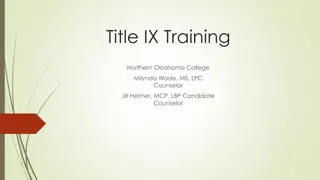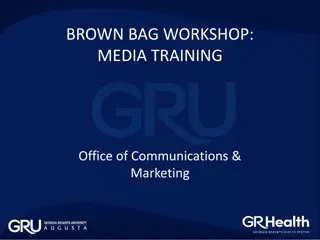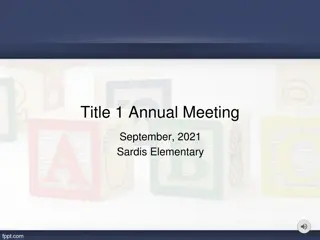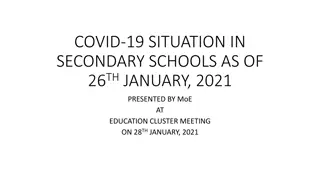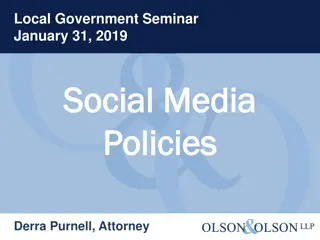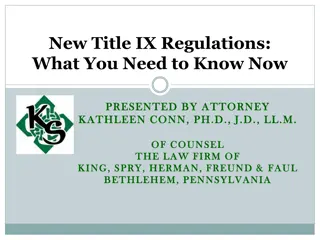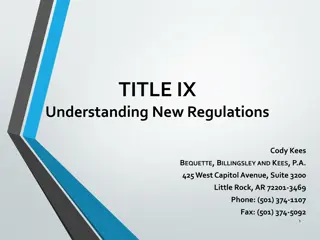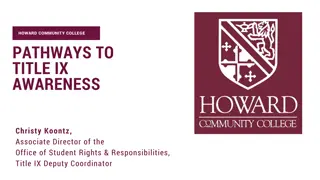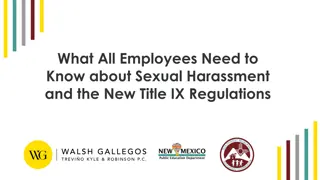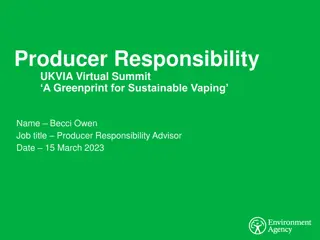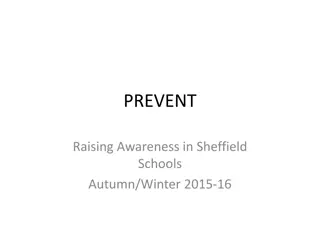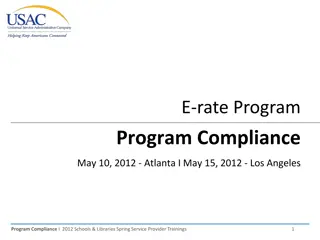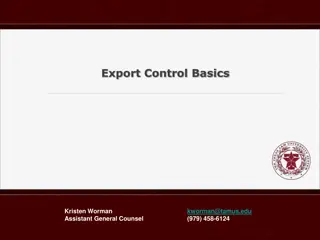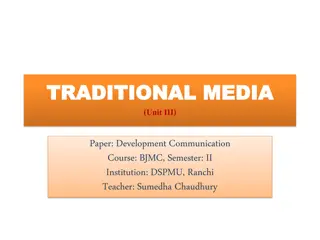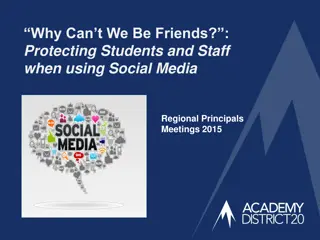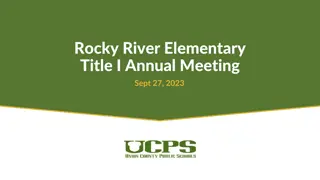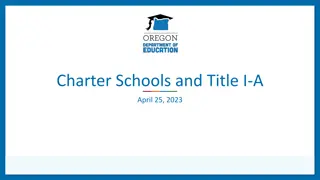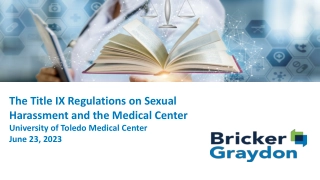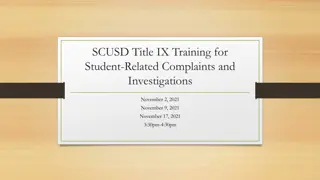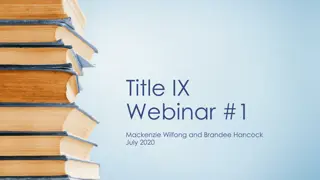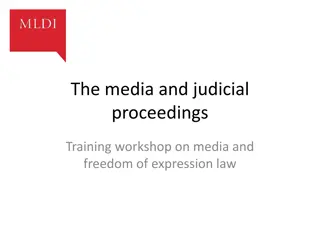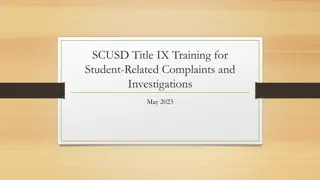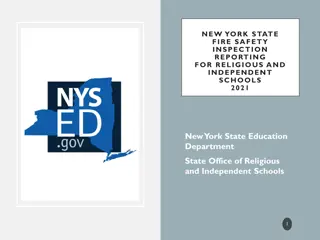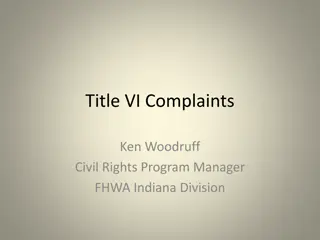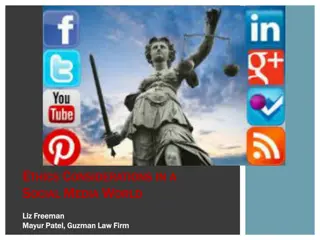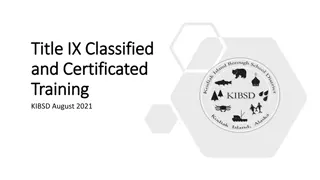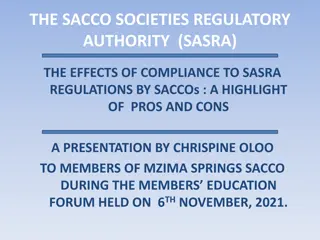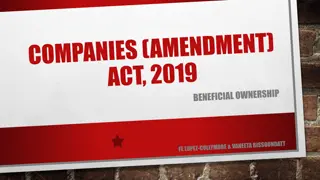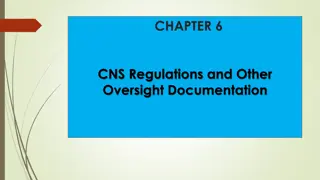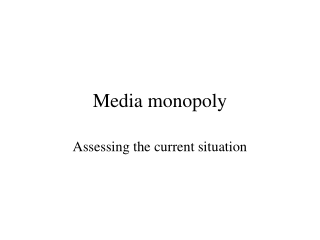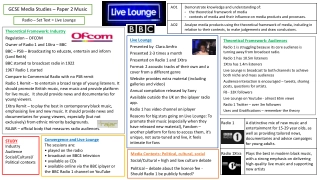Ensuring Compliance with Title IX Regulations in Media Schools
Overview of Title IX regulations in media schools across Illinois, Ohio, Colorado, and Miami. Highlights key coordinators, training information, non-discrimination policy, and the importance of preventing sex-based discrimination and harassment in educational settings.
Download Presentation

Please find below an Image/Link to download the presentation.
The content on the website is provided AS IS for your information and personal use only. It may not be sold, licensed, or shared on other websites without obtaining consent from the author. Download presentation by click this link. If you encounter any issues during the download, it is possible that the publisher has removed the file from their server.
E N D
Presentation Transcript
Be On Air Network Title IX Regulations Illinois Media Schools, Ohio Media Schools, Colorado Media Schools, and Miami Media Schools www.beonair.com
National Title IX School Coordinator Corporate Campus Director, Janet Garcia Email: jgarcia@beonair.com Phone: 305 728 1120 Address: 7955 NW 12thStreet Suite 119, Doral, FL 33126 Available via email, mail, or phone 24 hours/day Title IX Training for Coordinator OCR USDOE Webinar: Title IX regulations addressing sexual harassment, 2020.
Local Title IX Coordinators Ohio Media School-Cleveland Janice Hannah Hardy 9885 Rockside Road Ste 160 Valley View, OH 44125 (216) 242-4342 Ohio Media School-Cincinnati Scott Burrell 4411 Montgomery Road Norwood, OH 45212 (513) 813-4962 Ohio Media School-Columbus Rhonda Frazier 5330 E Main St. Suite 300 Columbus, OH 43213 (614) 423-4945 Illinois Media School-Chicago Tinka Randle 105 W Adams Ste 1900 Chicago, IL 60603 (331) 215-4768 Illinois Media School-Lombard Diana Rico 455 Eisenhower Lane S. #200 Lombard, IL 60148 (630) 426-1083 Miami Media School Janet Garcia 901 S Miami Ave #303 Miami, FL 33130 (720) 897-7528 Colorado Media School Jennifer Wickham 4380 S Syracuse Ste 400 Denver, CO 80237 (303) 647-1237
Overview of Title IX No person in the U.S. shall, on the basis of sex be excluded from participation in, be denied the benefits of, or be subjected to discrimination under any educational program or activity receiving Federal financial assistance. Title IX of the Education Amendments of 1972, and 34 C.F.R. Part 106 (Title IX) The School does not discriminate on the basis of sex in its educational programs, regardless of an individual s real or perceived sex, gender identity, and/or gender expression. Female, male, and gender non-conforming students, faculty, and staff are protected from any sex-based discrimination, harassment or violence. The School s Title IX Coordinators manage the policies and procedures related to Title IX, ensure compliance with respect to Title IX, and investigate and respond to complaints of sex-based discrimination and/or crimes.
Non-Discrimination Policy Beonair Network Schools prohibits discrimination and harassment based on race, color, creed, religion, sex, gender, national origin, citizenship, ethnicity, marital status, age, disability, sexual orientation, gender identity and gender expression, genetic information, veteran status, or any other status protected by applicable law to the extent prohibited by law.
Sexual Harassment Beonair Network Schools defines sexual harassment as unwelcome behavior of a sexual nature that relates to the gender or sexual identity of an individual and that has the purpose or effect of creating an intimidating, offensive or hostile environment for study. This policy applies to all interactions between students and MMS Media School s faculty members and other faculty, staff, and administrative personnel, and other students. Conduct alleged to be sexual harassment will be evaluated by considering the totality of the circumstances, including the nature, frequency, intensity, location, context, and duration of the questioned behavior. Repeated incidents or a pattern of harassing behavior may be cause for serious corrective action. However, a more serious incident, even if isolated, may be sufficient cause for action under this policy including referral to law enforcement when applicable. Quid pro quo sexual harassment can occur whether a person resists and suffers the threatened harm, or the person submits and avoids the threatened harm. Both situations could constitute discrimination based on sex. A hostile environment can be created by persistent or pervasive conduct or by a single severe episode. The more severe the conduct, the less need there is to show a repetitive series of incidents to prove a hostile environment. Sexual violence, including rape, sexual assault, and domestic and dating violence is a form of sexual harassment. In addition, the following conduct may violate this policy: 1. Observing, photographing, videotaping, or making other visual or auditory records of sexual activity or nudity, where there is a reasonable expectation of privacy, without the knowledge and consent of all parties. 2. Sharing visual or auditory records of sexual activity or nudity without the knowledge and consent of all recorded parties and recipients. 3. Sexual advances, whether or not they involve physical touching. 4. Commenting about or inappropriately touching an individual s body. 5. Requests for sexual favors in exchange for actual or promised job benefits, such as favorable reviews, salary increases, promotions, increased benefits, or continued employment. 6. Lewd or sexually suggestive comments, jokes, innuendoes, or gestures. 7. Stalking Other verbal, nonverbal, graphic, or physical conduct may create a hostile environment if the conduct is sufficiently persistent, pervasive, or severe so as to deny a person equal access to MMS Media School s programs or activities. Whether the conduct creates a hostile environment may depend on a variety of factors, including: the degree to which the conduct affected one or more person s education or employment; the type, frequency, and duration of the conduct; the relationship between the parties; the number of people involved; and the context in which the conduct occurred.
Unwelcome Conduct Conduct is unwelcome if a person (1) did not request or invite it and (2) regarded the unrequested or uninvited conduct as undesirable or offensive. That a person welcomes some sexual contact does not necessarily mean that person welcomes other sexual contact. Similarly, that a person willingly participates in conduct on one occasion does not necessarily mean that the same conduct is welcome on a subsequent occasion. Whether conduct is unwelcome is determined based on the totality of the circumstances, including various objective and subjective factors. The following types of information may be helpful in making that determination: statements by any witnesses to the alleged incident; information about the relative credibility of the parties and witnesses; the detail and consistency of each person s account; the absence of corroborating information where it should logically exist; information that the respondent has been found to have harassed others; information that the complainant has been found to have made false allegations against others; information about the complainant s reaction or behavior after the alleged incident; and information about any actions the parties took immediately following the incident, including reporting the matter to others. In addition, when a person is so impaired or incapacitated as to be incapable of requesting or inviting the conduct, conduct of a sexual nature is deemed unwelcome, provided that the respondent knew or reasonably should have known of the person s impairment or incapacity. The person may be impaired or incapacitated as a result of drugs or alcohol or for some other reason, such as sleep or unconsciousness. A respondent s impairment at the time of the incident as a result of drugs or alcohol does not, however, diminish the respondent s responsibility for sexual or gender-based harassment under this policy.
Gender-based harassment Gender-based harassment is verbal, nonverbal, graphic, or physical aggression, intimidation, or hostile conduct based on sex, sex-stereotyping, sexual orientation or gender identity, but not involving conduct of a sexual nature, when such conduct is sufficiently severe, persistent, or pervasive that it interferes with or limits a person s ability to participate in or benefit from MMS Media School s education or work programs or activities. For example, persistent disparagement of a person based on a perceived lack of stereotypical masculinity or femininity or exclusion from an activity based on sexual orientation or gender identity also may violate this policy.
Grievance procedure In the event a sex-based discrimination incident or crime occurs, the victim should take the following steps: Report the offense to the appropriate Title IX Coordinator, depending on location or whether distance education. In instances of sex-based crimes, preserve any evidence as may be necessary to the proof of the criminal offense. Request assistance, if desired, from school administration in reporting a sex-based crime to local law enforcement agencies. Request a change in the academic situation if necessary. Every incident will be investigated to determine the cause and the steps needed to prevent a recurrence. It shall be the responsibility of the Title IX Coordinator to obtain the complete and detailed facts of the incident as soon as possible after it occurs. The School will investigate all sex-based incident and crime complaints filed by a student or an employee regardless of where the incident occurred. Once all facts and details are obtained by the Title IX Coordinator from both parties and reviewed, a prompt, impartial and equitable determination will be made based on proven fact and/or a preponderance of the evidence which concludes that more likely than not the misconduct occurred. Both parties will have an opportunity to review and respond to evidence used in the investigation. The institution will disclose to the alleged victim and the accuser simultaneously the final results of the investigation. If law enforcement is involved in any incident, The School will abide by their findings. There will be no appeal process in incidents where law enforcement is involved. If a decision is made internally by a Title IX Coordinator, an appeal may be considered only in extenuating circumstances. If an Appeal is granted, additional information and documentation shall be provided to the Title IX Coordinator within 10 days of the original determination. Both parties will be notified simultaneously within 30 days of the appeal review of the final determination.
Disciplinary Actions Any and all sex-based crimes on campus are subject to action by local, state and federal law enforcement agencies. The Centers will promptly investigate any sex-based incident regardless of whether a victim decides to report the incident to law enforcement. However, if such an incident is reported to law enforcement as a result of the type and/or seriousness of such an incident The Center will not wait for the conclusion of a criminal proceeding and will conclude its own investigation within a semester s time. Any student or employee convicted of a sex-based crime will result in expulsion from the school for a student and termination of employment for an employee. The School will take immediate action to ensure a victim of such crime can continue their education free of ongoing sex discrimination or sexual harassment and will not retaliate against anyone filing a complaint.
Disciplinary Actions Following a Complaint See Title IX Coordinator or School website (www.beonair.com)







